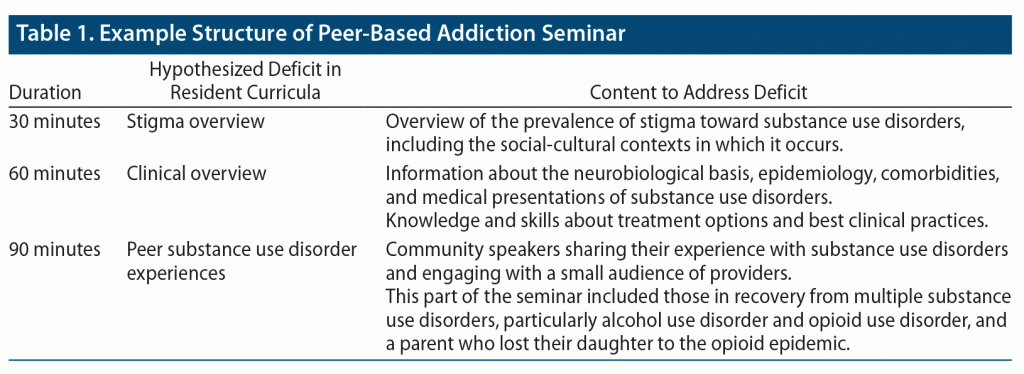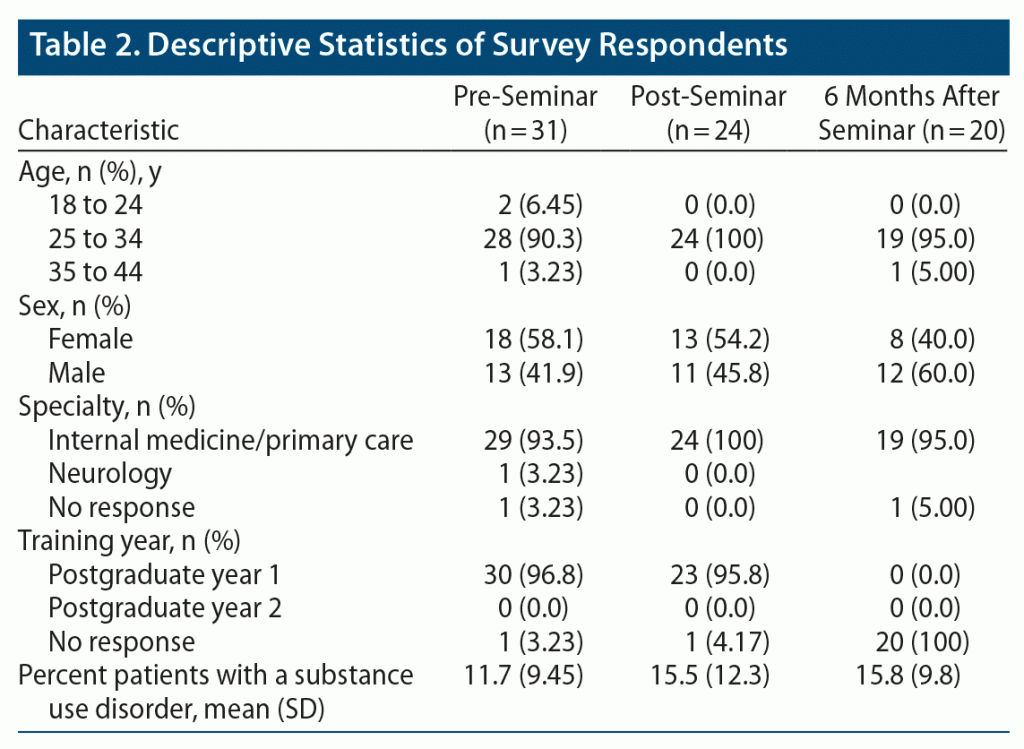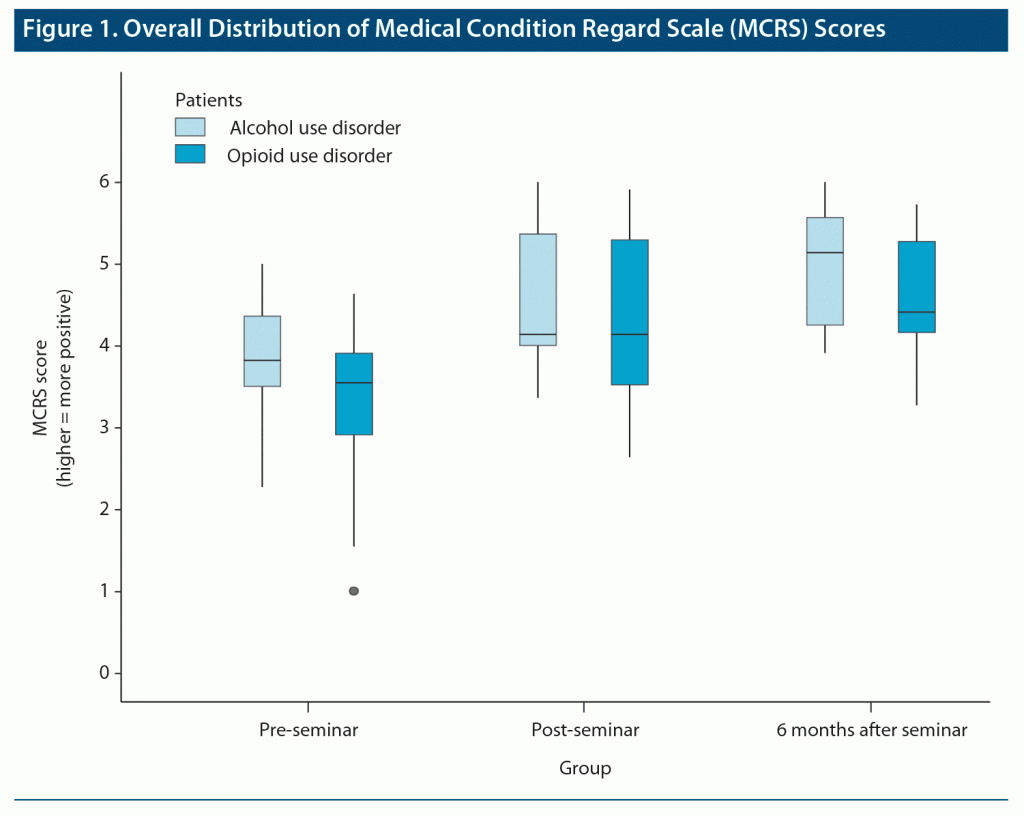ABSTRACT
Objective: Although internists frequently care for patients with substance use disorders (SUDs), they do not receive training that is adequate for the task. The resultant deficiencies in care are compounded by widespread stigma toward SUDs that exists within medicine. However, research demonstrates that sharing personal perspectives and experiences of living with an SUD generate empathy and change attitudes toward this disorder. The objective of this study was to improve internal medicine residents’ attitudes with an educational seminar that incorporates perspectives from patients with SUDs and their families.
Methods: The study was conducted with internal medicine residents at Weill Cornell Medical College from February 2019 to August 2019. The study used a cross-sectional, longitudinal survey design. Attitudes were measured using a validated Medical Condition Regard Scale (MCRS).
Results: A total of 31 internal medicine residents participated. Results showed significant increases in MCRS scores, both from pre- to post-seminar and 6 months after the seminar. For alcohol use disorder, mean (SD) MCRS score increased from 3.80 (SD = 0.69) to 4.60 (SD = 0.87) to 5.00 (SD = 0.68) (P < .001). For opioid use disorder, mean MCRS score increased from 3.30 (SD = 0.92) to 4.36 (SD = 0.99) to 4.62 (SD = 0.70) (P < .001).
Conclusion: The study demonstrates that long-term attitudes toward patients with SUDs may be modified through training that integrates peer-based perspectives.
Prim Care Companion CNS Disord 2021;23(5):20m02875
To cite: Sundaresh S, Appel G, Ho K, et al. Demonstrating the efficacy of incorporating peers into addiction training for internal medicine residents. Prim Care Companion CNS Disord. 2021;23(5):20m02875.
To share: https://doi.org/10.4088/PCC.20m02875
© Copyright 2021 Physicians Postgraduate Press, Inc.
aDepartment of Internal Medicine, New York-Presbyterian Hospital/Weill Cornell, New York, New York
bDepartment of Psychiatry, Weill Cornell Medical College, New York, New York
cDepartment of Population Health Sciences, Weill Cornell Medical College, New York, New York
dDepartment of Internal Medicine, Weill Cornell Medical College, New York, New York
eDepartment of Psychology, Princeton University, Princeton, New Jersey
*Corresponding author: Giselle Appel, MS, Department of Psychiatry, Weill Cornell Medical College, 525 East 68th St, Box 140, New York, NY ([email protected]).
Substance use disorders (SUDs) are prevalent in the United States: approximately 19.7 million Americans have been diagnosed with a SUD, including 14.5 million with alcohol use disorder and 7.5 million with an illicit substance use disorder.1 Internists frequently care for such patients due to the multiorgan sequelae of substance use. The objective of this study was to improve attitudes of internal medicine residents toward patients with SUDs.
There is a great need to improve attitudes toward patients with SUDs. First, negative attitudes toward these patients are prevalent across the medical field and are comparatively worse than attitudes toward other medical/psychiatric conditions.2 Many internists—across all levels of training—refer to these patients as a “heart sink,” and even providers who work in methadone maintenance clinics hold stigma toward patients with opioid use disorder.3 Second, these attitudes are a barrier to patient care. They are associated with poor patient-physician engagement, depersonalized patient care, and low provider empathy, all of which contribute to negative, downstream patient outcomes.4
The majority of addiction medicine curricula prioritizes knowledge and skill-based content, yet it does not address stigma.5 We developed a novel educational seminar for internal medicine residents that incorporates personal perspectives from patients with SUDs and their families, with the idea that sharing personal perspectives would generate empathy similar to how a peer recovery support group functions.6 We hypothesized that attitudes would improve following the seminar and that this change would be sustained 6 months later.
METHODS
The study used a cross-sectional, longitudinal survey design and was conducted between February and August 2019. The study was approved by the Weill Cornell Medical College Institutional Review Board.
Intervention
The intervention took place within an internal medicine residency program located in an urban, tertiary care center. A 1-time, 3-hour seminar was created based on past research about provider attitudes and beliefs toward patients with SUDs (Table 1). Thirty-one internal medicine residents were required to participate as part of their outpatient clinic education curriculum. Residents were placed in groups of 4 to 6 for the duration of the seminar. In the first 90 minutes, faculty members in addiction psychiatry and internal medicine delivered a lecture on SUDs (including an introduction on stigma, the sociocultural contexts in which SUDs occur, epidemiology, clinical presentations, and comorbidities), clinical care guidelines (including motivational interviewing and therapeutic approaches), and best treatment options (including first-line medications and psychotherapeutic modalities). Resources for further learning were highlighted as well, including prescribing training for maintenance medications for opioid use disorder. The remainder of the seminar was spent with the peers, who were recruited through the hospital system by one of the faculty members. The peers included individuals of varying ages (between age 35 and 60 years) in recovery from SUDs, specifically alcohol use disorder and opioid use disorder, and a parent who lost their daughter to the opioid epidemic. After speaking about their experiences in recovery and relapse, they provided an equal amount of time for the residents to ask questions, all without the faculty present. Following this segment, there was a 30-minute debrief with the faculty members.
Survey
An online survey was created using a web-based tool (SurveyMonkey.com, San Mateo, California). The survey was sent to the residents prior to the seminar and consisted of 2 sections: demographic information, which included information about level of training, and 2 separate but identical 11-item Medical Condition Regard Scales (MCRS),7 one in reference to alcohol use disorder and the other for opioid use disorder. The MCRS is a valid and reliable survey designed to assess the degree to which clinicians find individuals with a given medical condition to be regarded, treatable, and worthy of medical resources.7 The survey was sent again immediately post-seminar and then 6 months after the seminar. Respondents’ age, sex, and specialty and percentage of patients diagnosed with SUDs in a typical work week were described as percentages for categorical variables. Mean and standard deviation were described for continuous variables within the pre-, post-, and 6-month groups. Missing demographic data were present for certain fields, but data were described as missing rather than imputed. The MCRS score for each respondent was calculated as the mean Likert score for all 11 questions, after reversal of score for questions 1, 2, 4, 9, and 11 so that higher scores represented better attitudes.6
Two-sample t tests were used to compare the MCRS scores between the pre-, post-, and 6-month groups for each patient population. One-way analysis of variance was used to test the difference in attitude scores before, after, and 6 months after the seminar. All P values were 2-sided with statistical significance evaluated at the .05 α. The data were analyzed using R, version 3.4.3 (Vienna, Austria).
RESULTS
A total of 31 residents completed the pre-seminar survey, of whom 29 (94%) were internal medicine, 1 (3%) was neurology, and 1 (3%) did not specify specialty. A total of 24 residents completed the post-seminar survey, of whom all were internal medicine. Most respondents were aged 25–34 (Table 2). There were no significant differences between groups in terms of age or sex. The post-seminar and 6-month groups reported working with more patients with SUDs than the pre-seminar group, with each of these former groups reporting that more than 15% of their patients in the last week had SUDs compared to 11% of the pre-seminar group.
Increases in MCRS scores toward both alcohol and opioid use disorders were statistically significant, both from pre- to post-seminar and from post-seminar to 6-months after (Figure 1). For alcohol use disorder, the mean (SD) MCRS score increased from 3.80 (0.69) to 4.60 (0.87) to 5.00 (0.68) (P < .001). For opioid use disorder, the mean MCRS score increased from 3.30 (0.92) to 4.36 (0.99) to 4.62 (0.70) (P < .001).
DISCUSSION
The results provide evidence that a brief intervention can yield sustained, positive regard toward patients with SUDs. The unique aspect of our intervention—exposure to lived experiences with SUDs—suggests a route for creating durable improvement in provider attitudes. This is the first study of which we know that examines the impact of these perspectives on providers. Interventions like the one presented here show how a critical gap in addiction care might be filled by astutely modifying existing curricula.
The seminar likely improved attitudes by increasing providers’ mindfulness of their own attitudes toward SUDs and by generating empathy toward individuals with SUDs. By integrating lived experiences with an intimate connection to the disease, the widespread suffering of addiction can be more saliently understood. In-person patient narratives can challenge a provider’s bias against SUDs.8 These personal stories illustrate that these individuals are more than just numbers in a chart: they are complex and relatable human beings with multiple roles (eg, coworker, father, mother, sibling). Peer speakers in recovery also make salient the fact that such patients have the capacity to get better and deserve the attention and treatment that those with other medical disorders are given.7
Another variable that might have mediated attitudinal change was the setting of the training. The conversations took place in a conference room without the presence of attending physicians and with liberal time. The residents were thus able to take reflective pauses to contemplate the narratives and consider how stigma or discrimination has affected their own lives. This setting served to remove the “them versus us” distinction that often characterizes the hospital environment. It is also suggested that one of the strongest mediators of attitudinal change can be the compassion and empathy generated from carrying similar or personal experiences.7 Indeed, recent research has found that 12.9% of male physicians and 21.4% of female physicians meet diagnostic criteria for alcohol abuse or dependence, though this is often not openly discussed.9 Holding the space to identify with another’s struggle, considering that striking statistic, might have generated a greater depth of compassion.
The study, of course, did not address all questions. It remains unclear if an attitude-based intervention is superior to a skills-based one, as our training also provided clinical skills to care for patients with SUDs. Research demonstrates that these skills can improve interactions between provider and patient and ultimately improve provider attitudes.3,8 On the other hand, attitude-based interventions have the advantage of explicitly addressing a deficiency of the “hidden” curriculum in medicine. Addressing this deficit is especially important, because even providers who are already clinically trained to work with patients with SUDs hold negative attitudes.2 If such providers can improve their attitudes, as we demonstrate, perpetuation of negative belief systems can be mitigated.5
This study provides a foundation for future research. First, given that many perceive negative attitudes toward individuals with SUDs as relatively intractable, we demonstrate that long-term modification of such attitudes is possible and should be pursued in earnest. Second, the study shows that potential cures need not be expensive or time-consuming.
Future work should isolate the effects of peer perspectives on attitudes, thus making clear the precise extent to which it is beneficial. Additional studies might also explore the nexus of provider and patient demographics, exploring whether attitudinal change might track such features. Methodological limitations include low response rate and self-reporting. The anonymity of the study did not allow for MCRS scores to be paired per respondent. In addition, the study did not include a control group of residents (ie, no intervention), which should be considered in future research studies.
This seminar was designed to be a comprehensive program that would fill in a gap in addiction medicine education, in particular by addressing a hypothesized deficit of both the explicit and hidden residency curricula. The results strengthen the rationale that shared experiences by peers should be integrated into residency curricula.
Submitted: November 21, 2020; accepted February 18, 2021.
Published online: October 7, 2021.
Potential conflicts of interest: Dr Joseph Avery is supported by the Department of Defense through external funding by the National Defense Science & Engineering Graduate Fellowship Program. Dr Jonathan Avery is partially supported by the Brause Family Junior Faculty Assistance Award. Ms Ho was partially supported by the following grant: Clinical and Translational Science Center at Weill Cornell Medical College (1-UL1-TR002384-01). Drs Sundaresh and Card and Ms Appel report no conflicts of interest related to the subject of this article.
Funding/support: None.
Clinical Points
- Stigma toward patients with substance use disorders is a significant barrier to patient care.
- Clinicians can overcome their stigma by engaging with patient experiences with substance use disorders in a nonmedical setting.
References (9)

- Substance Use and Mental Health. National Institute of Mental Health. Accessed August 26, 2021. https://www.nimh.nih.gov/health/topics/substance-use-and-mental-health/index.shtml
- Avery J, Knoepflmacher D, Mauer E, et al. Improvement in residents’ attitudes toward individuals with substance use disorders following an online training module on stigma. HSS J. 2019;15(1):31–36. PubMed CrossRef
- Luo S, Lin C, Feng N, et al. Stigma towards people who use drugs: a case vignette study in methadone maintenance treatment clinics in China. Int J Drug Policy. 2019;71:73–77. PubMed CrossRef
- Luoma JB, Chwyl C, Kaplan J. Substance use and shame: a systematic and meta-analytic review. Clin Psychol Rev. 2019;70:1–12. PubMed CrossRef
- Gaufberg EH, Batalden M, Sands R, et al. The hidden curriculum: what can we learn from third-year medical student narrative reflections? Acad Med. 2010;85(11):1709–1716. PubMed CrossRef
- Eddie D, Hoffman L, Vilsaint C, et al. Lived experience in new models of care for substance use disorder: a systematic review of peer recovery support services and recovery coaching. Front Psychol. 2019;10:1052. PubMed CrossRef
- Christison GW, Haviland MG, Riggs ML. The Medical Condition Regard Scale: measuring reactions to diagnoses. Acad Med. 2002;77(3):257–262. PubMed CrossRef
- Hammer RR, Dingel MJ, Ostergren JE, et al. The experience of addiction as told by the addicted: incorporating biological understandings into self-story. Cult Med Psychiatry. 2012;36(4):712–734. PubMed CrossRef
- Oreskovich MR, Shanafelt T, Dyrbye LN, et al. The prevalence of substance use disorders in American physicians. Am J Addict. 2015;24(1):30–38. PubMed CrossRef
Enjoy this premium PDF as part of your membership benefits!








